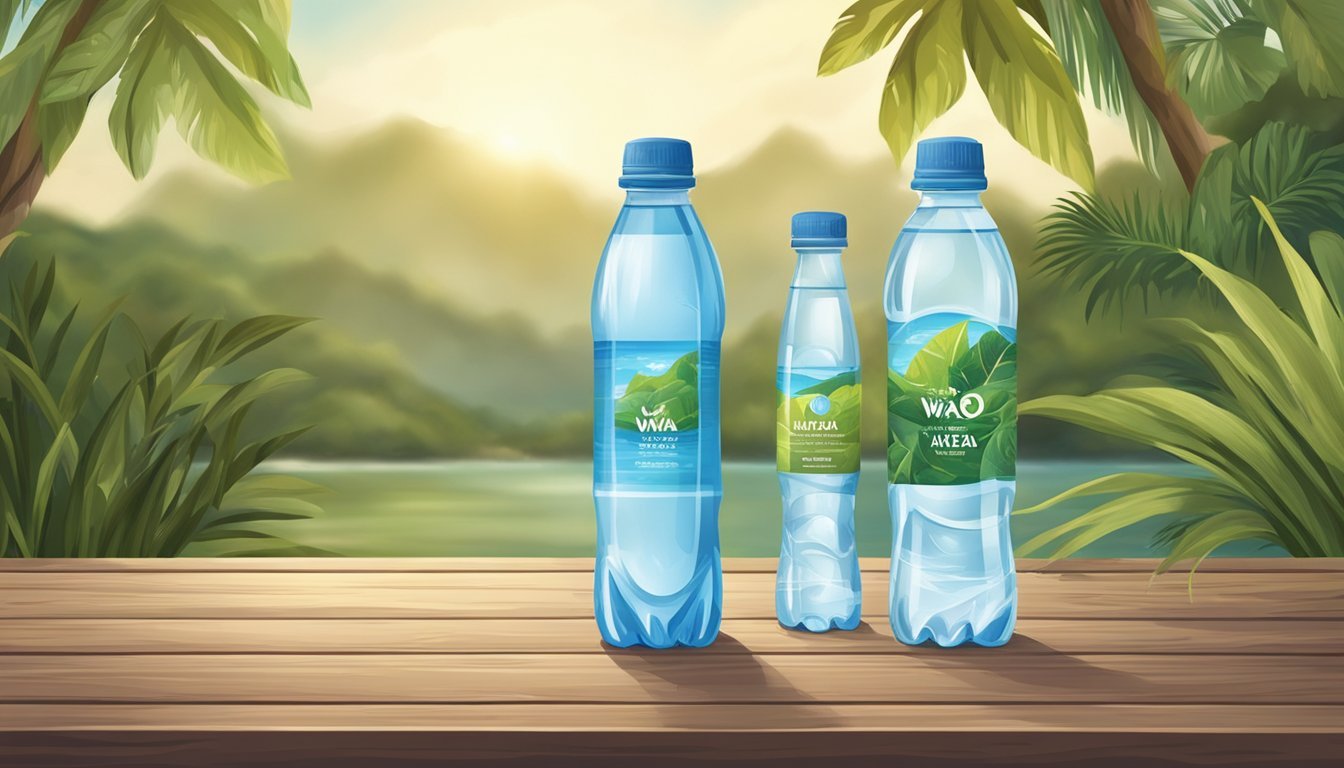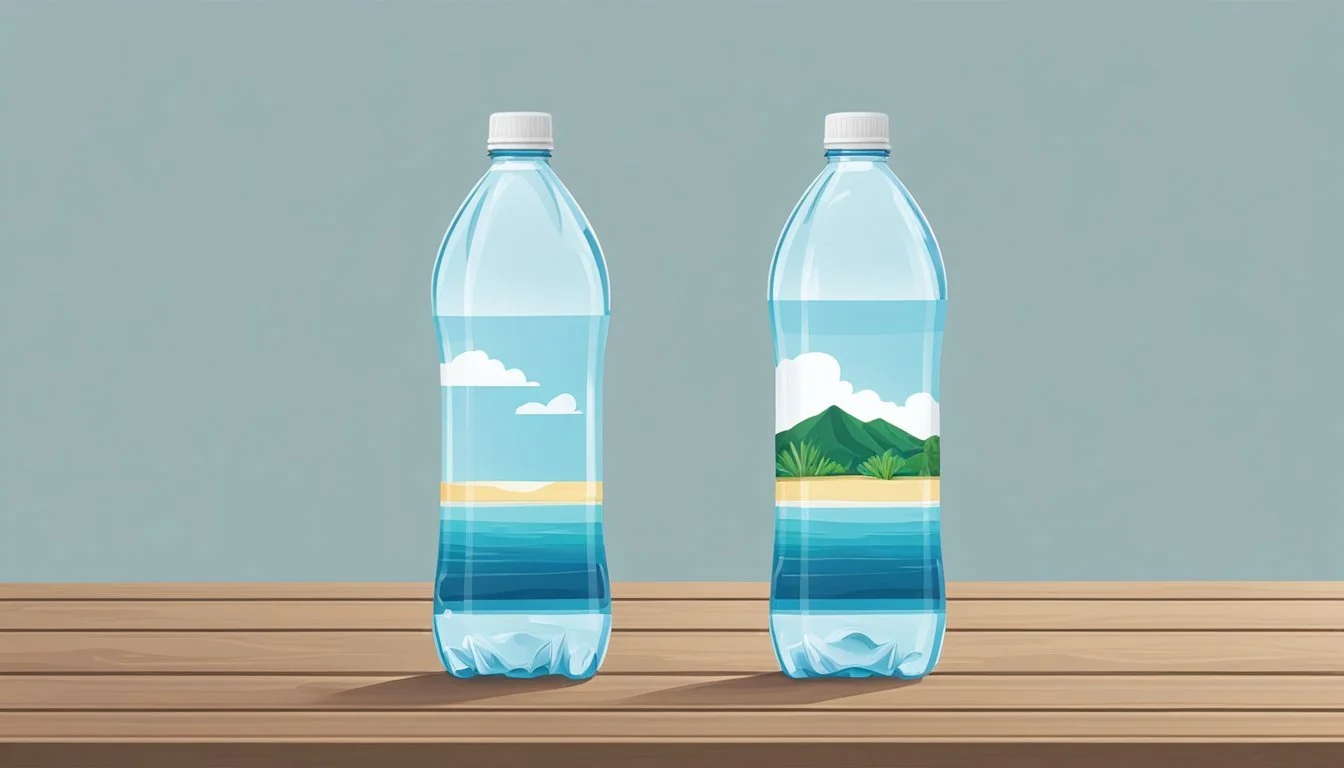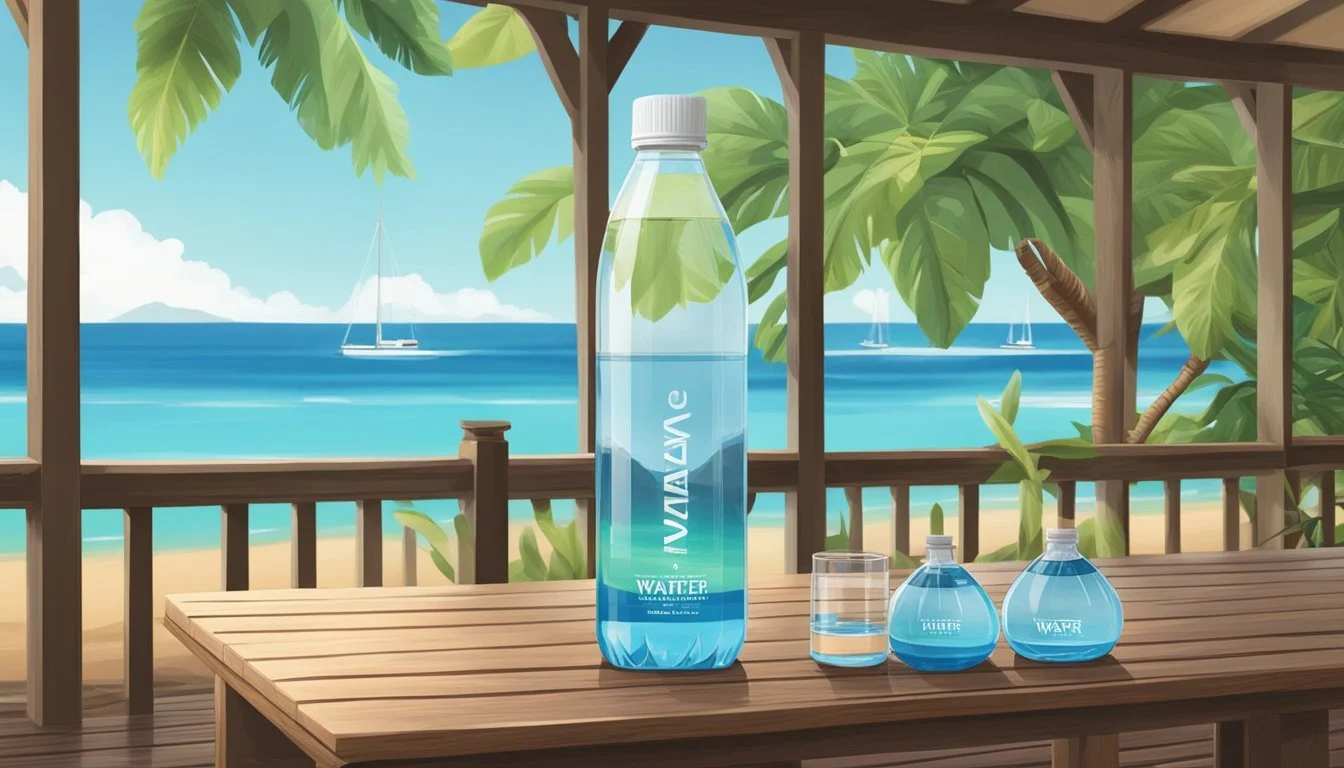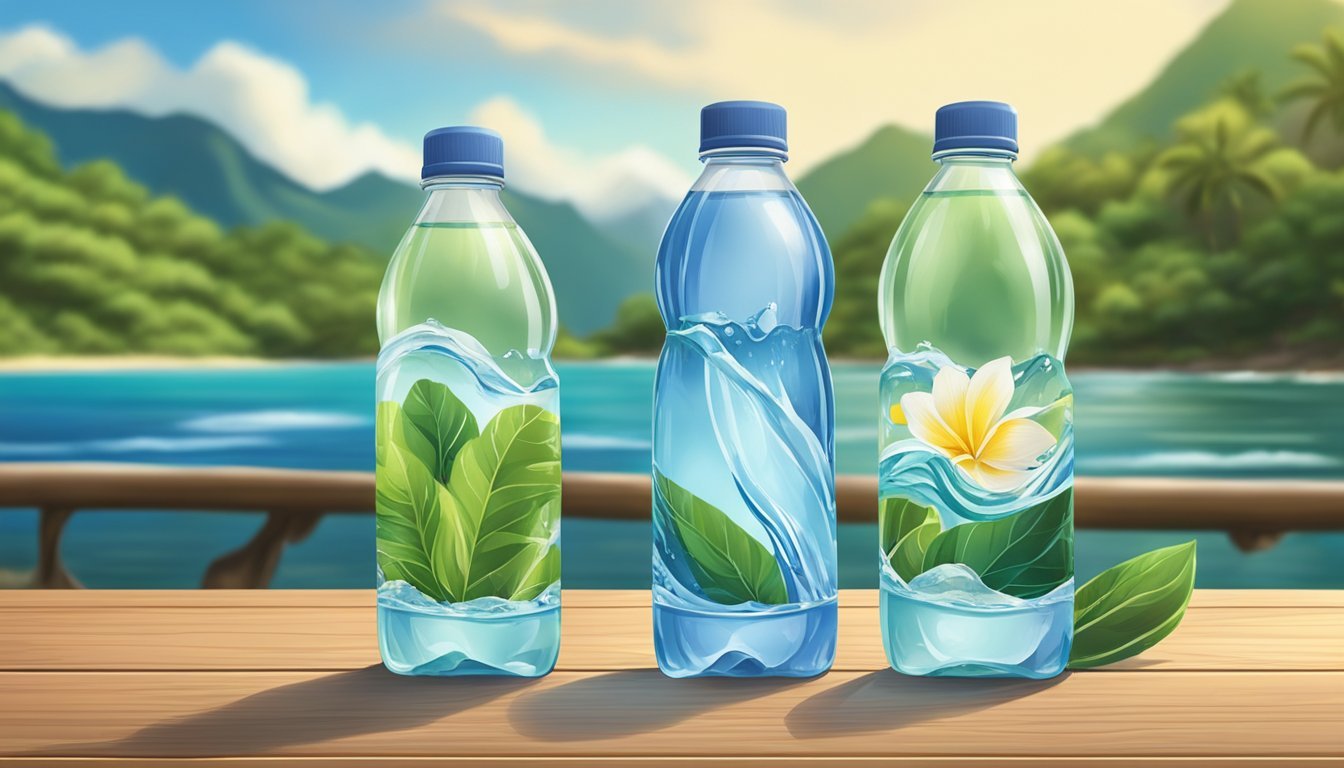Just Water vs. Waiakea
Which Bottled Water is Better for You?
Choosing the best bottled water can be a surprisingly nuanced decision. Just Water and Waiakea, two popular brands, offer unique benefits that set them apart in the market. Just Water's sustainability and Waiakea's higher pH level make them appealing for different reasons, depending on what the consumer values more: eco-friendliness or alkalinity.
Just Water sources its water from natural springs and emphasizes sustainability with its plant-based, recyclable packaging. It boasts a lower environmental impact, appealing to those who prioritize green practices. On the other hand, Waiakea water is known for its alkaline nature, with a pH of 8.2 and its richness in natural minerals and electrolytes, providing potential health benefits.
Waiakea also donates a portion of its revenues to charitable causes, which adds a socially responsible aspect to the brand. This dual focus on health and philanthropy can make Waiakea particularly attractive to those who value both personal wellness and contributing to good causes.
Comparing Just Water and Waiakea
Just Water and Waiakea stand out in the crowded bottled water market due to their unique attributes.
pH Levels: Just Water typically has a neutral pH of around 7.4, whereas Waiakea, sourced from volcanic wells in Hawaii, boasts a naturally alkaline pH ranging from 7.6 to 8.8. This alkaline nature is believed to help neutralize acidity in the body.
Sustainability: Both brands emphasize environmental responsibility. Waiakea is the first US bottled water to be certified Carbon Neutral, and they donate a portion of revenue to nonprofits. Just Water is packaged in paper-based cartons, which are more environmentally friendly than traditional plastic bottles.
Source and Packaging: Waiakea water is rich in electrolytes and minerals, thanks to its filtration through volcanic rock. It is bottled directly at the source, maintaining its purity. Just Water is sourced from a spring in the USA and is packaged in 100% recyclable cartons.
Health Benefits: Waiakea contains essential minerals like silica, beneficial for hair, skin, and nail health. Just Water is less mineral-dense but prides itself on being a pure and clean water option.
Taste: Waiakea's filtration process through volcanic rock gives it a clean, crisp taste. Just Water's taste is often described as smooth and fresh, with no added flavors or treatments.
Feature Just Water Waiakea pH Level ~7.4 7.6-8.8 Source USA Spring Hawaiian Volcanic Wells Sustainability Recyclable Cartons Carbon Neutral, Nonprofit Support Minerals Basic mineral profile Rich in electrolytes and silica Taste Smooth and fresh Clean and crisp
Both Just Water and Waiakea offer unique benefits, making them strong contenders in the premium bottled water market.
Origin and Source
Just Water and Waiakea are two popular bottled water brands, each with unique sources and origins that contribute to their appeal. Understanding the specific origins and characteristics of these waters can help consumers make an informed choice.
Natural Spring Water and Its Origins
Just Water sources its water from natural springs located in Glens Falls, New York. These springs are constantly replenished by a natural water cycle involving rainfall and groundwater flow. The water is known for its purity and naturally balanced pH levels.
Just Water emphasizes sustainability in its sourcing process. Local wetlands are protected, ensuring the ecosystem remains intact. The company's approach reflects a commitment to environmental stewardship and community welfare.
The Significance of the Mauna Loa Volcano for Waiakea
Waiakea draws its water from the base of Mauna Loa, an active volcano in Hawaii. This Hawaiian volcanic water is naturally filtered through thousands of feet of porous volcanic rock. This natural filtration process enriches the water with minerals and electrolytes, giving it a distinct taste and health benefits.
The volcanic source imparts alkalinity to Waiakea water, evidenced by its pH range of 7.6 to 8.2. The bottling facility operates using 100% renewable energy and utilizes recycled materials, further emphasizing Waiakea's commitment to sustainability.
Composition and Health Benefits
In comparing Just Water and Waiakea, it is essential to examine their mineral content, electrolyte presence, pH levels, and the potential health impacts. These factors can help determine which option may be more beneficial for different needs.
Mineral Content Analysis
Just Water features a natural mineral profile primarily sourced from spring water, including calcium, magnesium, and potassium. Waiakea Water, on the other hand, is sourced from the Mauna Loa volcano in Hawaii, giving it a distinctive mineral composition. Waiakea boasts a higher content of silica, which contributes to its smooth taste, alongside substantial levels of calcium and magnesium.
Mineral Just Water (mg/L) Waiakea Water (mg/L) Calcium 20 32 Magnesium 5 13 Potassium 2 8 Silica N/A 32
Electrolytes and Hydration
Electrolytes such as calcium, magnesium, and potassium play critical roles in maintaining hydration and facilitating bodily functions. Just Water contains essential electrolytes, but in relatively lower quantities.
Waiakea Water is notable for its naturally occurring electrolytes, contributing to improved hydration. The electrolyte composition in Waiakea, combined with its unique volcanic source, implies an enhanced hydrating effect. This can be particularly beneficial for athletes or individuals needing to rehydrate rapidly after intense physical activities.
Exploring pH Levels and Alkalinity
pH levels are a significant differentiator between Just Water and Waiakea Water. Just Water has a neutral pH of around 7.5, making it neither acidic nor alkaline. Waiakea Water stands out with a naturally alkaline pH of 8.8.
Higher alkalinity can neutralize body acids and is often promoted for better health benefits. However, it is important to consider individual health needs and preferences when choosing between neutral and alkaline water.
Water Type pH Level Just Water 7.5 Waiakea Water 8.8
Potential Health Impacts
The health impacts of both waters depend largely on their mineral content and pH levels. Waiakea's high alkaline pH and mineral richness may support digestive health, reduce acid reflux, and improve overall hydration.
Just Water, with its balanced mineral content and neutral pH, provides a more moderate option that still supports hydration and general body functions. Those looking for a refreshing, less mineralized beverage might prefer Just Water, while those interested in alkaline benefits might lean towards Waiakea.
Each individual’s health requirements and tastes will determine which water is more suitable for them.
Taste Profile
Just Water and Waiakea are known for their unique taste profiles, driven by their sources and production processes.
Just Water offers a crisp and clean flavor. This is largely due to its spring water source and the company's minimal processing, which maintains the natural taste.
Waiakea, on the other hand, has a subtly sweet and smooth taste. Its volcanic origin in Hawaii contributes to this distinct flavor. The water is naturally filtered through volcanic rock, imbuing it with minerals.
Comparing the two:
Just Water:
Crisp
Clean
Minimal aftertaste
Waiakea:
Smooth
Slightly sweet
Mineral-rich
Both brands avoid the common issue of having a plastic-like taste, often found in other bottled waters. This contributes to their pleasant drinking experience.
Environmental Sustainability
Just Water and Waiakea Water both emphasize their commitment to environmental sustainability through their packaging choices and company practices. Their approaches to reducing plastic use and minimizing their carbon footprint are key aspects.
Sustainable Packaging and Plastic Use
Just Water uses cartons that are 82% made from renewable resources. The cartons are primarily plant-based, contributing to a reduction in plastic waste. This choice aligns with the brand’s focus on reducing its environmental impact.
Waiakea Water, on the other hand, utilizes bottles made completely from post-consumer recycled PET (rPET). This method not only reuses plastic but also decreases the need for new plastic production. Additionally, these bottles are fully recyclable, further minimizing environmental damage.
Comparison Table:
Brand Packaging Materials Renewable Resource Percentage Just Water Plant-based cartons 82% Waiakea rPET bottles (recycled plastic) 100% (recycled)
Carbon Footprint and Company Practices
Just Water takes substantial steps to reduce its carbon footprint. Their manufacturing and sourcing processes are designed to be as environmentally friendly as possible. The company places a high emphasis on reducing greenhouse gas emissions during production.
Waiakea Water prides itself on being the first US bottled water certified Carbon Neutral. They achieve this through a combination of sustainable practices, including using renewable energy sources and supporting reforestation projects. Furthermore, the company donates over 5% of its revenue to various environmental and social causes globally.
In comparison, Waiakea's commitment to carbon neutrality and significant charitable contributions highlight its proactive role in global sustainability efforts, setting it apart from many competitors.
Production and Treatment Processes
The production and treatment processes of Just Water and Waiākea focus on unique filtration methods and source integrity. Emphasis is placed on sustainability and health benefits tailored to their specific sources.
Filtration and Purification Methods
Just Water utilizes a combination of advanced filtration techniques to ensure purity and safety. They emphasize reverse osmosis and ultrafiltration, both removing impurities and contaminants. The reverse osmosis process forces water through a semi-permeable membrane, effectively eliminating particles, ions, and unwanted molecules.
They also integrate a robust carbon filtration stage, which helps in removing chlorine, sediment, and organic compounds, resulting in purified water. Further, UV sterilization is employed to eradicate any remaining bacteria or pathogens without chemical additives.
Waiākea Water, on the other hand, naturally filters through volcanic rock, which is detailed below, but also undergoes minimal additional treatment to maintain its natural properties. Their commitment to sustainability is evident in the use of energy-efficient systems to pump and bottle the water, reducing their carbon footprint.
Natural Filtration Through Volcanic Rock
Waiākea Water is sourced from one of the purest environments on Earth, near the Mauna Loa volcano. The water begins as snowmelt and rain, then filters through thousands of feet of volcanic rock. This natural filtration process enriches the water with essential minerals such as calcium, magnesium, and silica.
The volcanic rock acts as a natural filter, removing potential contaminants without the need for extensive reverse osmosis or chemical treatments. This process not only enhances the taste but also imparts a unique alkalinity with a pH of 8.8, beneficial for neutralizing acidity in the body.
The water's journey through the volcanic rock makes Waiākea distinct, offering a naturally fortified and sustainable product directly from Hawaiian springs. The source's integrity is rigorously protected to ensure consistency and purity in every bottle.
Community and Consumer Health
Choosing the right bottled water impacts both community and consumer health. Just Water and Waiakea have distinct advantages that cater to these critical areas.
Just Water emphasizes sustainability, sourcing its water from a spring in New York. It contributes positively to the local community by creating jobs and investing in environmental initiatives. Their packaging is 100% recyclable and made from 82% renewable resources, reducing plastic waste and promoting a healthier environment.
Waiakea sources water from Hawaiian volcanic rock, providing naturally alkaline water. This brand focuses on health benefits such as reducing the risk of cognitive decline due to the silica content. They also support community health through clean water projects in developing regions, donating a week’s supply for every liter purchased.
Brand Community Impact Health Benefits Just Water Creates local jobs, eco-friendly packaging Provides pure spring water, sustainable practices Waiakea Clean water projects in developing regions High alkaline pH, silica reduces cognitive decline risk
Consumer health is another crucial factor. Just Water offers water free from harmful substances due to its stringent filtration processes. Waiakea’s water is free from contaminants like PFAS, known to have adverse health effects, making it a safer choice.
Both brands demonstrate a commitment to community well-being through various initiatives, making them valuable choices for health-conscious consumers.
Pricing and Accessibility
Just Water and Waiakea cater to different segments of the bottled water market, each with its own pricing and accessibilities.
Just Water offers a more budget-friendly option, typically priced between $1 to $2 per bottle. They emphasize sustainable packaging, using 100% recyclable materials. Just Water is widely available in major retail stores and online, making it a convenient choice for eco-conscious consumers.
Waiakea water, sourced from volcanic wells in Hawaii, is positioned at a premium price point, ranging from $2 to $3 per bottle. Its unique mineral composition and naturally alkaline pH justify the higher cost. Waiakea is also found in popular grocery chains and online platforms, though it may not be as ubiquitous as Just Water.
When considering cost and convenience, Just Water presents a more accessible and economical option. Waiakea appeals to those willing to invest in higher-end water with added health benefits.
Comparative Reviews and Rankings
When comparing Just Water and Waiakea, several key aspects come into play, including reviews, total dissolved solids (TDS), pH balance, and water quality.
Reviews
Just Water: Many reviewers appreciate Just Water's eco-friendly packaging. Made from 54% paper, the cartons are seen as a sustainable alternative to plastic. The taste receives positive feedback for its freshness and neutrality.
Waiakea: Waiakea users highlight the clean, crisp taste. The brand's commitment to sustainability and social responsibility also draws praise.
Total Dissolved Solids (TDS)
Just Water: Reports suggest that Just Water has a moderate level of TDS, indicating a balanced mineral content.
Waiakea: Waiakea has a higher level of TDS compared to Just Water, which contributes to its mineral-rich profile.
pH Balance
Just Water: The pH of Just Water is typically around 8.0. This slightly alkaline pH is beneficial for neutralizing acids in the body.
Waiakea: Waiakea offers a naturally alkaline pH of 8.2, derived from its volcanic filtration. The slight variance in pH can be a personal preference choice for consumers.
Water Quality
Just Water: The water used by Just Water is sourced from Glen Falls, New York. The filtration process maintains the water's natural minerals while ensuring purity.
Waiakea: Sourced from Hawaii, Waiakea water filters through volcanic rock, enriching it with minerals like silica. This thorough, natural filtration process results in high-quality, mineral-rich alkaline water.
Comparison Table:
Attribute Just Water Waiakea Reviews Positive taste, eco-friendly packaging Crisp taste, sustainable practices TDS Moderate Higher pH Balance ~8.0 8.2 Water Quality Naturally sourced, filtered for purity Volcanic filtration, mineral-rich
Brand Philosophies and Core Values
Just Water emphasizes sustainability and environmental stewardship. By using plant-based packaging materials, they aim to reduce plastic waste. Their mission aligns closely with promoting healthier living and minimizing environmental impact. Founded by Jaden Smith, Just Water's approach combines eco-friendly beliefs with community projects aimed at providing clean water.
Waiakea focuses on sustainability and social responsibility as well. Sourced from a volcanic well in Hawaii, it is naturally alkaline. Waiakea's packaging is made from 100% RPET (recycled polyethylene terephthalate), which means it reduces its carbon footprint significantly. Additionally, Waiakea promotes clean water access in developing regions.
Both brands prioritize ethical sourcing and environmental consciousness. While PepsiCo and Coca-Cola dominate the beverage industry with mass-produced options, Just Water and Waiakea carve niches by emphasizing core values that resonate with eco-conscious consumers. Their commitment to these philosophies differentiates them from larger, less environmentally-focused competitors.
Conclusion
When comparing Just Water and Waiakea, several key factors come into play. Both offer unique benefits, making the choice dependent on individual preferences and priorities.
Source and Sustainability
Waiakea: Sourced from a volcanic well in Hawaii, emphasizes sustainability and is certified Carbon Neutral.
Just Water: Uses 82% renewable resources for its packaging with significant emphasis on reducing carbon footprint.
pH Levels
Waiakea: Naturally alkaline with a pH range of 7.6 to 8.8.
Just Water: Typically maintains a balanced pH closer to neutral, around 7.
Health Benefits
Waiakea: High alkaline pH may help neutralize body acidity and contains electrolytes and essential minerals.
Just Water: Infused with naturally occurring minerals, it supports basic hydration needs effectively.
Community impact
Waiakea: Donates over 5% of revenue to nonprofits in Hawaii and globally.
Just Water: Collaborates with local communities to ensure fair use and sustainability of water resources.
Taste and Experience
Waiakea: Known for its crisp and refreshing taste due to volcanic filtration.
Just Water: Mild and clean taste, with a focus on eco-friendly packaging enhancing the overall consumer experience.
Both Waiakea and Just Water offer excellent options, each with strengths in sustainability, health benefits, and community impact. The decision ultimately rests on which aspects hold more value to the consumer.
More About Just Water
Core Hydration vs Just Water: Which Bottled Water is Better?
Icelandic Glacial vs Just Water: Which Bottled Water is Better?
Just Water vs Aqua Carpatica: Which Bottled Water is Better?
Just Water vs Cascade Mountain: Which Bottled Water is Better?
Just Water vs Crystal Geyser: Which Bottled Water is Better?
Just Water vs Hawaii Volcanic: Which Bottled Water is Better?
Just Water vs Hawaiian Springs: Which Bottled Water is Better?
Just Water vs Kirkland Signature: Which Bottled Water is Better?
Just Water vs Mountain Valley Spring Water: Which Bottled Water is Better?
Just Water vs Nestle Pure Life: Which Bottled Water is Better?
Just Water vs Richard's Rainwater: Which Bottled Water is Better?
Just Water vs San Pellegrino: Which Bottled Water is Better?
Just Water vs Solan de Cabras: Which Bottled Water is Better?
Just Water vs Talking Rain AQA: Which Bottled Water is Better?
Just Water vs Whole Foods 365: Which Bottled Water is Better?
Just Water vs Whole Foods Italian Still Mineral water: Which Bottled Water is Better?
More About Waiakea
Icelandic Glacial vs Waiakea: Which Bottled Water is Better?
Mountain Valley Spring Water vs Waiakea: Which Bottled Water is Better?
Waiakea vs Kirkland Signature: Which Bottled Water is Better?
Waiakea vs Richard's Rainwater: Which Bottled Water is Better?
Waiakea vs Whole Foods Italian Still Mineral water: Which Bottled Water is Better?









